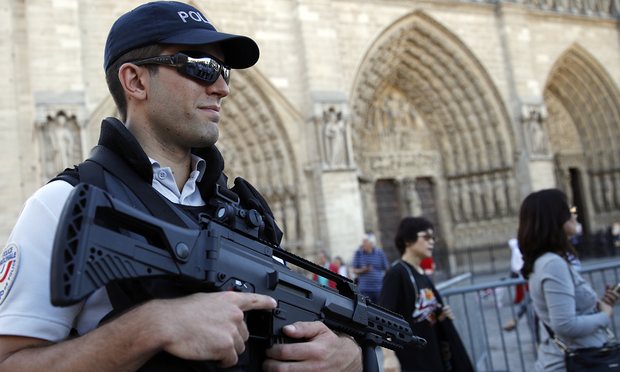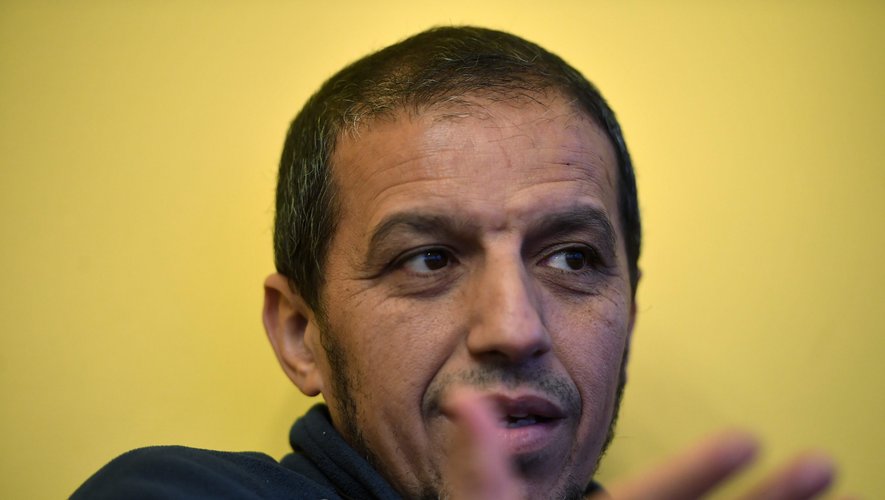A cell of radicalized French women guided by Islamic State commanders in Syria was behind a failed terrorist attack near Paris’s Notre Dame Cathedral last weekend and planned another violent attack this week before they were intercepted by police, the Paris prosecutor has said.
The women, aged 19, 23 and 39, were arrested in Boussy-Saint-Antoine, a small town 30km southeast of Paris, on Thursday night after they were linked to the discovery of a car packed with gas cylinders parked near the cathedral last weekend. Officials said the women had been planning an imminent violent attack on the busy Gare de Lyon station in Paris and were stopped after a police and intelligence operation described as a “race against time”.
The car had no plates and was left with indicators flashing in a narrow alley. From the insurance sticker on the car, police traced it back to a father of five daughters originally from the Seine-Saint-Denis area north of Paris.
One of the daughters, aged 19, who was named by news agencies as Ines Madani, was known to intelligence agencies and had been on a radicalisation watchlist for her wish to leave to join jihadis in Syria. At the time the car was found, she had been missing from home for several days.
Police on Thursday traced Madani and two other women to a flat in Boussy-Saint-Antoine in the Essonne area south of Paris. They arrested the three women when they left the flat. During the arrest, one of the women stabbed a police officer with a large kitchen knife, and Madani jumped on another officer attempting to stab him. The police opened fire and Madani was injured. When she was arrested, Madani had the keys to the Peugeot 607 in her handbag and a note pledging her allegiance to Isis and a reproduction of an Isis text vowing “we will attack you on your territory to attack your spirits and terrorise you”. Isis propaganda was found on her computer at her home.
A 15-year-old girl, who is the daughter of one of the three women arrested, Amel S, was separately detained on Friday morning in Clichy-sous-Bois, north of Paris. The prosecutor said the teenager could have been implicated in the planned terrorist attack.
The French interior minister, Bernard Cazeneuve, had said of the three women detained on Thursday that they were “radicalised and fanaticised” and believed to have been preparing “new and imminent violent action”. He said there had been a “race against time” to stop them, involving a vast police and intelligence operation.
“France is confronted with a terrorist threat of unprecedented scale,” he added. The changing threat took different forms and was very hard to detect, he added, calling for the “vigilance of all citizens”.
The Paris prosecutor, François Molins, said one of the women arrested, who he referred to as Sarah H, aged 23, had been engaged at different times to two French extremists who themselves had carried out deadly attacks this year.
She had been engaged to Larossi Abballa, who in June murdered a police commander and his police officer partner at their home in Magnanville outside Paris in the presence of their three-year-old son. He filmed the aftermath on Facebook Live before dying in a police raid. She was also betrothed to Adel Kermiche, who slit the throat of an elderly French priest during morning mass in Normandy in July. Her current fiancé was arrested on Thursday, Molins said.
The prosecutor said the cell of women terrorists showed that Islamic State “intends to make women into fighters”. He said that if women had previously been “confined to family and domestic tasks” by the militant group, that vision was now strongly out of date. “Their aim was to commit an attack,” he said of the women.
The group’s first attempted attack involved parking a Peugeot 607 car packed with gas cylinders near the cathedral in the heart of Paris and trying to blow it up. The car was also found to have contained diesel canisters and a barely-smoked cigarette had been thrown into the car near a canister with traces of hydrocarbons. Molins said the perpetrators had clearly tried to blow the car up and if they had succeeded it would have led to the explosion of the whole vehicle.
The car had no plates and was left with indicators flashing in a narrow alley. From the insurance sticker on the car, police traced it back to a father of five daughters originally from the Seine-Saint-Denis area north of Paris.
One of the daughters, aged 19, who was named by news agencies as Ines Madani, was known to intelligence agencies and had been on a radicalisation watchlist for her wish to leave to join jihadis in Syria. At the time the car was found, she had been missing from home for several days.
Police on Thursday traced Madani and two other women to a flat in Boussy-Saint-Antoine in the Essonne area south of Paris. They arrested the three women when they left the flat. During the arrest, one of the women stabbed a police officer with a large kitchen knife, and Madani jumped on another officer attempting to stab him. The police opened fire and Madani was injured. When she was arrested, Madani had the keys to the Peugeot 607 in her handbag and a note pledging her allegiance to Isis and a reproduction of an Isis text vowing “we will attack you on your territory to attack your spirits and terrorise you”. Isis propaganda was found on her computer at her home.
A 15-year-old girl, who is the daughter of one of the three women arrested, Amel S, was separately detained on Friday morning in Clichy-sous-Bois, north of Paris. The prosecutor said the teenager could have been implicated in the planned terrorist attack.
The French interior minister, Bernard Cazeneuve, had said of the three women detained on Thursday that they were “radicalised and fanaticised” and believed to have been preparing “new and imminent violent action”. He said there had been a “race against time” to stop them, involving a vast police and intelligence operation.
“France is confronted with a terrorist threat of unprecedented scale,” he added. The changing threat took different forms and was very hard to detect, he added, calling for the “vigilance of all citizens”.
The French president, François Hollande, said: “There’s a group that has been annihilated, but there are others. Information we were able to get from our intelligence services allowed us to act before it was too late.’’
Speaking on Friday morning, an interior ministry official told Reuters: “An alert has been issued to all stations, but they had planned to attack the Gare de Lyon on Thursday.”
The train station, one of the busiest in Paris, is in the south-east of the capital.
The discovery of the Peugeot 607 near Notre Dame carrying seven gas cylinders, six of them full, led to a terrorism investigation and revived fears about further attacks in a country where Islamic militants have killed more than 230 people since January 2015.
Several people have been arrested and questioned in the case of the car of gas cylinders. A 27-year-old man and a 26-year-old woman were detained on Wednesday south of Paris and a second couple, a 34-year-old man and a 29-year-old woman, were detained on Tuesday.
Earlier this week, Florence Berthout, the mayor of Paris’s fifth arrondissement, said the discovery of the car highlighted the need to increase security in the French capital. “Police and army staffing must be stepped up,” she told news channel BFMTV.
The vehicle was left in a zone where parking is strictly prohibited and had remained there for about two hours before it came to the attention of police after being reported by a waiter at a nearby restaurant, she said.
Thousands of extra police and soldiers have been deployed to protect sensitive sites across France. A state of emergency declared after the coordinated attacks on Paris last November remains in place and gives police extra search and arrest powers, but there has been a continuing political debate about security levels since 85 people were killed when a man driving a lorry ploughed into crowds celebrating Bastille Day on 14 July in Nice.
Sources
http://www.liberation.fr/video/2016/09/09/trois-femmes-radicalisees-interpellees-au-sud-de-paris_1490849
https://www.theguardian.com/world/2016/sep/09/cell-of-french-women-radicalised-by-isis-behind-failed-notre-dame-attack






